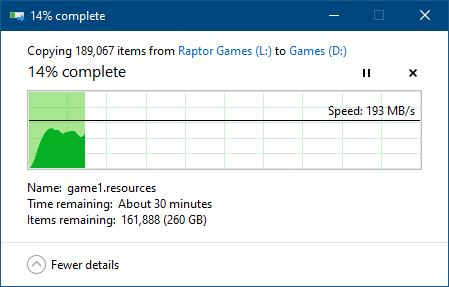A few years ago I had my entire system on a Raptor 150 and it was more than fine. As I added MMOs and games, it started to show its limitations. I had a ton of bloated games that I would likely never play again, so I dumped EQ, Vanguard, and EQ2 onto an old storage drive and suddenly there was more than enough space! When making my most recent storage decision, I tried to think about what games I am currently playing and how much space I would need. A quick perusal of my Steam and WoW folder showed that I had 120gb of games so my decision was easy as I went with a Samsung 256gb ssd. I have 95gb free with everything installed and have not even plugged in the Samsung 1tb Spinpoint I bought to go with it for media.Thanks for the write-up!
Newegg has the VR 1TB for $250 shipped with coupon EMCNDJA33 (exp.6/25).
Right now I have 200GB of games installed, with a mere 5 games that I have touched in the past few months (around 48GB). Windows and the rest of the software I use (plus random data) is around 39GB. Heck, I should just uninstall the games that I know for a fact I'll probably never play again.
I think I have owned around eight Raptor/VelociRaptor drives over the years (still have most of them). I like what they are and how they perform, but with a 256GB SSD costing less than a 1TB VelociRaptor (just ordered Crucial M4 256GB for $180 -$9 cashback) and more than being able to hold all my stuff, the VR is a tough sell for me even at $250. I am not opposed to owning one. It is merely the $/GB versus current SSD pricing along with my actual capacity needs that makes SSDs my choice.
If I was only using one drive, the Velociraptor would be the one to go with. I am a WD fan and have enjoyed using Raptor drives in the past, but I just don't need the space and if I do, I can use a secondary drive at a fraction of the cost while enjoying the speed benefits of an SSD for my primary.





